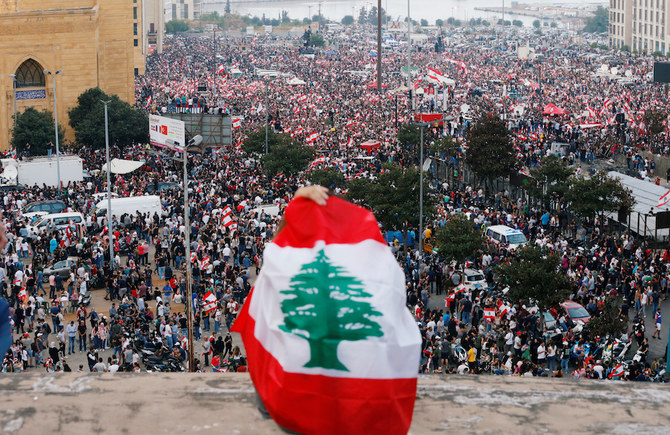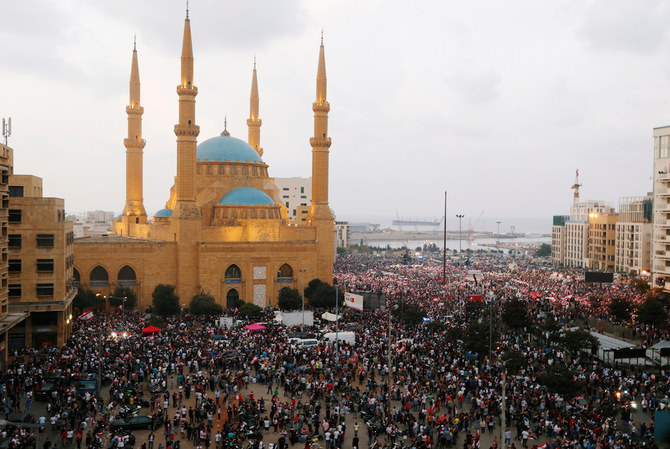BEIRUT: Lebanese Prime Minister Saad Al-Hariri agreed on Sunday a package of reforms with government partners to ease an economic crisis that has sparked protests aimed at ousting a ruling elite they see as riddled with corruption and cronyism.
Officials told Reuters the agreement was reached as hundreds of thousands of protesters flooded the streets in the biggest show of dissent against the establishment in decades.
A sea of people, some waving Lebanese flags, crammed roads for the fourth day, calling for revolution in protests that resembled the 2011 Arab revolts that toppled four presidents.
Hariri, who is leading a coalition government mired by sectarian and political rivalries, gave his feuding government partners a 72-hour deadline on Friday to agree reforms that could ward off crisis, hinting he may otherwise resign.
Hariri accused his rivals of obstructing his reform measures that could unlock $11 billion in Western donor pledges and help avert economic collapse.
The reform decisions require a 50% reduction in salaries of current and former presidents, ministers and MPs plus cuts in benefits to state institutions and officials. It also obliges the central bank and private banks to contribute $3.3 billion to achieve a “near zero deficit” for the 2020 budget.
It also includes a plan to privatise its telecommunications sector and an overhaul to its costly and crumbling electricity sector, which poses one of the biggest strains on the country’s depleted finances.
Meanwhile, Saudi Arabia's Ambassador to Beirut, Waleed Bukhari, said 132 Saudi citizens have been evacuated from Lebanon on Sunday, following an emergency meeting aimed at planning, securing and ensuring the safety of the Kingdom's citizens in the country.
HOPEFUL
The anti-government protests, fueled by crippling economic conditions and anger at perceived government corruption, have fanned out across the country since Thursday.
Cheerful, buoyant and hopeful their protests would bring change, people of all ages and religions played patriotic songs and danced in the streets, with some forming human chains and chanting for their leaders to be ousted.
Festival-like scenes dominated the country from the capital Beirut to remote towns, with loudspeakers blaring music as crowds kept pouring into the streets.
“I am here because I am disgusted by our politicians. Nothing works. This is not a state. Salaries are very low, prices are very high. We don’t even have work these days,” said Cherine Shawa, 32, an interior architect, in Beirut.
Ending rampant corruption is a central demand of the protesters, who say the country’s leaders have used their positions to enrich themselves for decades through favorable deals and kickbacks.
“We’re here to say to our leaders ‘leave’. We have no hope in them but we’re hopeful that these protests will bring change,” Hanan Takkouche, in her 40s and among a group of women in the capital. “They came to fill their pockets. They’re all crooks and thieves,” she added.
Many blamed the ruling elite for driving their children out of Lebanon because they failed to build a country that could provide jobs.
Army troops and security forces deployed across the country and blocked roads leading to the presidential palace. Banks said they would remain closed on Monday and the main labor union announced a general strike, threatening further paralysis.
CONDITIONS MET
A chorus of voices, from union leaders to politicians, have joined popular calls for Hariri’s government to resign. The Maronite Christian Lebanese Forces party has said its four ministers would withdraw from the government.
But the approval of the reforms by Hariri’s feuding partners seem to have met his conditions and would most likely push him to stay the course, government sources say,.
If Hariri resigns it would be harder for the various parties that make up the ruling coalition to form a new cabinet.
A new cabinet would also likely see Iranian-backed Hezbollah and its allies more in control, a shift that would make it nearly impossible for international donors or Gulf Arab countries at odds with Iran to offer aid or investments.
Without a foreign funding boost, officials and economists predict a currency devaluation or a debt default within months.
The IMF said last week that Lebanon’s crisis requires tough austerity measures such as tax hikes and levies on fuel, steps the country’s politicians have publicly vowed not to take.
Lebanon’s economy registered just 0.3 percent growth last year. The IMF said the reforms were needed to stem a ballooning deficit and public debt it forecasts to reach 155 percent of GDP by year-end.
The officials said the budget would not include additional taxes or fees after a decision last week to put a levy on WhatsApp calls triggered the unrest.
The reforms also called for establishing new regulatory and transparency bodies within a “short period” of time to oversee reform plans.




























